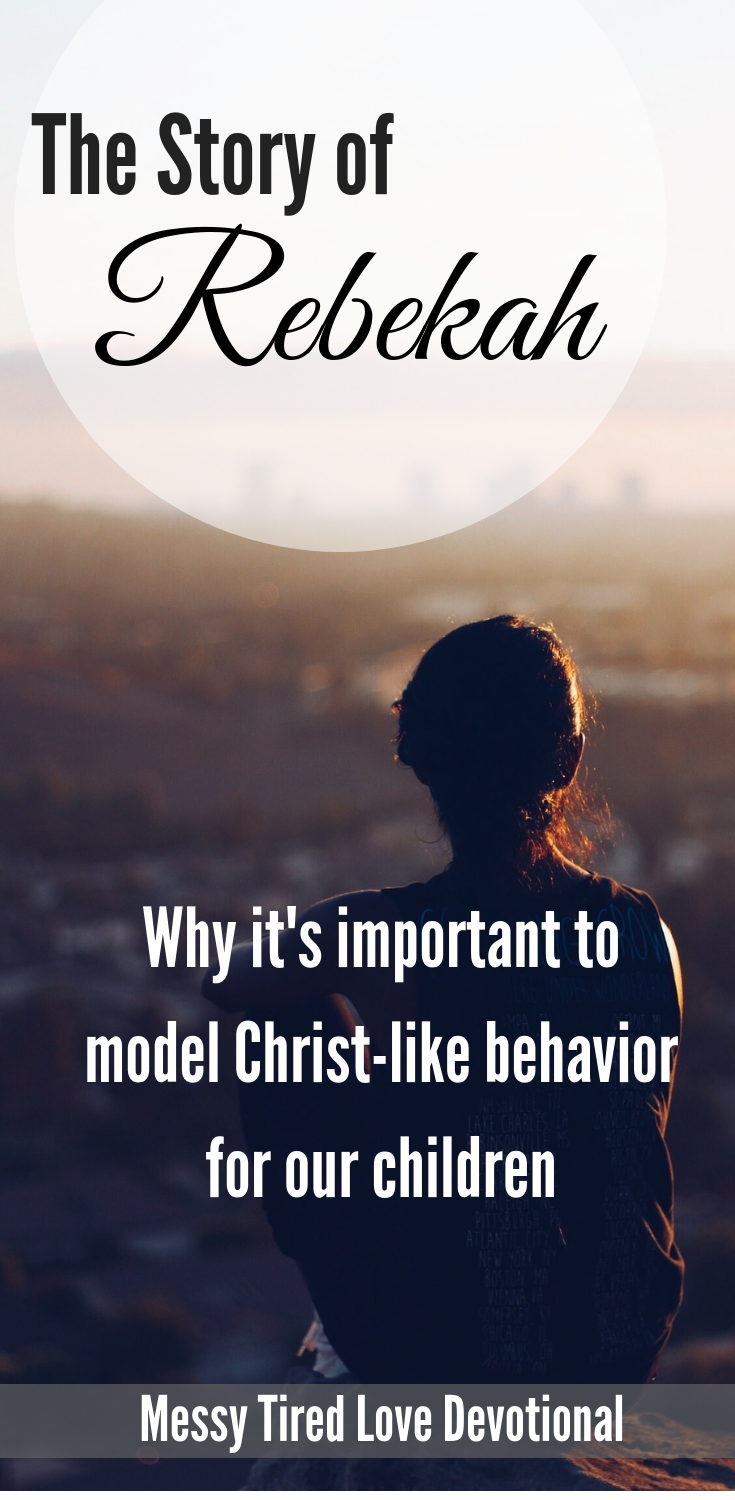This is the story of Rebekah and why it’s important to model Christ-like behavior. Her story is riddled with mistakes and bad choices, but she is still counted as worthy as a mother, as a woman who left a legacy that pointed her children (and so many, many more) to Jesus.
19 This is the account of the family line of Abraham’s son Isaac. Abraham became the father of Isaac, 20 and Isaac was forty years old when he married Rebekah daughter of Bethuel the Aramean from Paddan Aram and sister of Laban the Aramean.
21 Isaac prayed to the Lord on behalf of his wife, because she was childless. The Lord answered his prayer, and his wife Rebekah became pregnant. 22 The babies jostled each other within her, and she said, “Why is this happening to me?” So she went to inquire of the Lord.
23 The Lord said to her,
“Two nations are in your womb,
and two peoples from within you will be separated;
one people will be stronger than the other,
and the older will serve the younger.”
24 When the time came for her to give birth, there were twin boys in her womb. 25 The first to come out was red, and his whole body was like a hairy garment; so they named him Esau. 26 After this, his brother came out, with his hand grasping Esau’s heel; so he was named Jacob. Isaac was sixty years old when Rebekah gave birth to them.
27 The boys grew up, and Esau became a skillful hunter, a man of the open country, while Jacob was content to stay at home among the tents. 28 Isaac, who had a taste for wild game, loved Esau, but Rebekah loved Jacob.
29 Once when Jacob was cooking some stew, Esau came in from the open country, famished. 30 He said to Jacob, “Quick, let me have some of that red stew! I’m famished!” (That is why he was also called Edom.)
31 Jacob replied, “First sell me your birthright.” 32 “Look, I am about to die,” Esau said. “What good is the birthright to me?” 33 But Jacob said, “Swear to me first.” So he swore an oath to him, selling his birthright to Jacob.
34 Then Jacob gave Esau some bread and some lentil stew. He ate and drank, and then got up and left. So Esau despised his birthright.
Genesis 25:19-34
Twins! Rebekah was pregnant with twins that were “struggling within her” so hard it hurt. In Genesis 25:22, she says, “why is this happening to me?”
Feeling your baby move is an amazing experience. But do you remember how painful those elbow jabs and roundhouse kicks can be during pregnancy? They can seriously hurt. The fighting between Rebekah’s boys started in the womb and she felt it. And so their story begins…
How to NOT Model Christ-Like Behavior
Rebekah was very blessed, but she and her husband Isaac made choices that negatively affected her children – just like we do. One of the first things we learn in this story is that both parents had a favorite. Isaac loved Esau and Rebekah loved Jacob. The boys were different in every way. Esau was hairy, loved the outdoors, sport, and hunting – a real man’s man. Jacob was quiet and enjoyed staying inside. When parents show favoritism, it creates problems not only in the parent/child relationships involved, but also between the children. We learn that Esau and Jacob didn’t like each other much and plotted against one another. Jacob took advantage of Esau’s exhausted state after a long day in the field. Esau gave into his immediate needs and sold his birthright for some stew. His reasoning? “I’m about to die!” Apparently children have always been dramatic. I didn’t know a bowl of stew could save someone from death, did you?
Learning from Rebekah: when parents show favoritism, it creates problems not only in the parent/child relationships involved, but also between the children. #leavingyourmomlegacy Click To TweetThe story of Jacob buying Esau’s birthright with a bowl of stew makes us shake our heads. Our mamma instinct sees so many teaching moments to use in a moment like this:
Jacob, just give him a bowl of stew! He is your brother and you both should take care of one another.
Esau, you are not going to die. You are just hungry. Get the bowl of stew yourself if Jacob isn’t being helpful.
Jacob, is what you are offering to your brother fair and honest? If you were in his shoes, how would you feel about this situation?
Esau, take a deep breath and use your brain. Is selling your birthright – a long term asset – for a bowl of stew – something that will only fill your belly for a few hours – a fair deal? Think beyond your immediate view, son.
The Bible doesn’t tell us how Rebekah dealt with this situation, or even if she did anything at all. But the next part of the story reveals that Rebekah’s own behavior falls in line with what we just saw from Jacob. Her favorite son was modeling his behavior after what he saw from her. Deception and menacing plots must have been a regular occurrence in the family. Like so many homes today, Jacob and Esau did not have a safe and loving place to grow up.
Grab your Bible and read Genesis 27 before diving into the rest of the story. It’s not terribly long and is an integral part of Rebekah’s story.
Chapter 27 shows us that Rebekah and Jacob worked together to swindle Esau out of his blessing. In fact, the whole thing was mom’s idea. She deceived both her husband and her son Esau. They were distraught at the end of the exchange, but it was too late. The damage was done, and the pain was excruciating for both men.
How To Model Christ-Like Behavior
Mommas, there is so much to Rebekah’s story for us to reflect on. It should break our hearts that her children didn’t have a good relationship with each other. There is more to their rivalry than just parenting (Genesis 25:23), but we know that Rebekah and Isaac’s favoritism had a lot to do with it. We clearly see that the entire family was at odds with one another. My husband once told me that, as a man, one of the most satisfying affirmations he could ever receive is knowing his father is proud of him and that his mother loves him. Jacob and Esau seemed to only have one or the other, not both.
Rebekah and Isaac not only added tension among their children, their dysfunctional family environment brought tension into their marriage. Rebekah hurt Isaac in her web of lies. God created us to be man’s helper (Genesis 2:18) and one with our husband (Mark 10:8). She was doing neither. When we work together with our husband, we are honoring God and honoring our marriage. We can’t sacrifice our marriage in pursuit of making our children happy. The end result is heartache for everyone – the kids and the adults.
When we work together with our husband, we are honoring God and honoring our marriage. We can’t sacrifice our marriage in pursuit of making our children happy. #leavingyourmomlegacy Click To TweetNow, there are many mommas who do not have a husband for one reason or another. God sees you. He hears your prayers. You are not alone. You can learn a lot from Rebekah’s story too.
Who is that father-figure in your child’s life? Or is there a mentor or trusted friend that your child bonds with? It could be a grandparent, a teacher, a neighbor, or a leader at church. Whoever it is, that person is your parenting partner. Be intentional about working together with this person to guide and teach your child. Don’t be jealous of the affection between your child and this person. Instead, rejoice that it is there! Talk with this person specifically about how you appreciate his or her influence in your child’s life and make a plan to work together for the child’s good.
Just like ours, Rebekah’s legacy is not a shiny, perfect one. But the Bible boldly records her story among the other men and women that are counted as worthy to be a part of Jesus’ backstory. Her bad decisions and parenting fails weren’t bad enough to stop her from leaving an incredible legacy. She raised two men, one of which would become Israel, father of the 12 tribes of God’s chosen people.
Just like ours, Rebekah’s legacy is not a shiny, perfect one. But the Bible boldly records her story – she is counted as worthy to be a part of Jesus’ backstory. #leavingyourmomlegacy Click To TweetREAD MORE DEVOTIONALS
NOTE: By clicking links below, I may earn a small commission if you decide to purchase the products from Amazon.
This is a devotional except from Leaving Your Mom Legacy: A 30-Day Devotional On Reflecting Christ In Motherhood, available on Amazon in paperback and Kindle. Order yours today!
For more one day devotionals from Messy Tired Love, click here. To learn more about these devotionals for Christian moms, click here.





 Welcome to Messy Tired Love! The devotionals you'll find here aim to connect your everyday mom moments to the truth of the gospel. I hold nothing back as I share my story that's filled with lots of messy, tired, but oh-so-filled-with-love moments. I have three little blessings, that together with God's Word are the inspiration for these devotionals. I hope you will be encouraged, and maybe even get a good laugh, while exploring these devotionals. Much love!
Welcome to Messy Tired Love! The devotionals you'll find here aim to connect your everyday mom moments to the truth of the gospel. I hold nothing back as I share my story that's filled with lots of messy, tired, but oh-so-filled-with-love moments. I have three little blessings, that together with God's Word are the inspiration for these devotionals. I hope you will be encouraged, and maybe even get a good laugh, while exploring these devotionals. Much love!
Wow, I wouldn’t have gotten all those parenting principles from that story. Thanks so much for writing this.
I’m glad you enjoyed it, Andrew! You’re welcome!
Thanks for writing about this subject. It’s clear that family was dysfunctional, in large part because of all the favouritism and deception that was modelled from Jacob’s mother, and the favouritism towards Esau from Isaac. Both children were desperately in search of the blessing and words of affirmation, and when they didn’t get it from their parents, they sought it elsewhere. It’s definitely something we need to demonstrate to our children who will look to what their parents do when they are young.
Kristina, thanks for your post. Rebekah’s story does highlight the dangers and repercussions stemming out of a parent favouring one of his or her children. There is no doubt that it can cause significant disharmony in the parental relationship and tension and hurt amongst the children. As a registered clinical counsellor and educator there have many times I observed this play out in families. Your post is a great reminder that we need to be very thoughtful and careful in how treat and raise and love our children .
Rebekah was desperate with her pagan daughters in law.If Essau got the blessings,he would be the de facto master of the household and it would confer more power to his wives in the women’s section of the household.She might be subjugated by the wives of Essau then as she herself remarked,her life would not be worth living.That is why she was determined that her unmarried son get the
blessings.She thought she could get Jacob to marry her own relative and get a more sympathetic and understanding daughter in law.